Best Motherboards For Ryzen 7 9700X
Introduction
Power of the Ryzen 7 9700X
The AMD Ryzen 7 9700X, built on the Zen 5 architecture, is a high-performance 8-core, 16-thread processor designed to deliver outstanding performance for gaming, content creation, and multitasking. Its blend of efficiency and raw power makes it an excellent choice for both enthusiasts and professionals. However, the CPU can only perform at its best when paired with the right motherboard that complements its features and ensures system stability.
Importance of Choosing the Right Motherboard
The motherboard is the foundation of any PC build. It connects all major components, including the CPU, GPU, RAM, storage devices, and power delivery systems. For a powerful chip like the Ryzen 7 9700X, selecting the right motherboard ensures smooth performance, efficient cooling, and long-term reliability. Additionally, it provides access to modern technologies such as PCIe 5.0, DDR5 memory, USB 4.0, and Wi-Fi 6E, all of which play a crucial role in creating a future-proof system.
AM5 Socket and Chipset Compatibility
The Ryzen 7 9700X exclusively uses the AM5 socket, which supports the latest features of AMD’s 9000 series processors. Motherboards with AM5 sockets come in different chipset options—X670E, X670, B650E, and B650—each offering a unique balance of performance, features, and affordability. Enthusiasts who need top-tier performance for gaming or overclocking often opt for X670E or X670 motherboards, while budget-conscious users looking for strong performance without unnecessary extras can choose B650E or B650 boards.
DDR5 and PCIe 5.0 Support
One of the standout features of AM5 motherboards for the Ryzen 7 9700X is native support for DDR5 memory. This ensures faster data transfer rates, improved multitasking, and lower latency compared to older DDR4 platforms. Similarly, PCIe 5.0 support allows for faster GPUs and NVMe SSDs, ensuring your build is ready for next-generation performance. When paired with a compatible motherboard, the Ryzen 7 9700X can deliver blazing-fast gaming and productivity experiences.
Connectivity and Future-Proofing
Modern motherboards designed for the Ryzen 7 9700X come equipped with advanced connectivity options, including USB 3.2 Gen 2×2, USB 4.0, 2.5G/10G Ethernet, and Wi-Fi 6E. These features make data transfer seamless, provide ultra-fast networking, and support the latest peripherals. Additionally, many boards include multiple M.2 slots with heatsinks for NVMe drives, helping users build high-speed storage solutions for gaming, editing, or professional workloads.
Top Motherboards For Ryzen 7 9700X
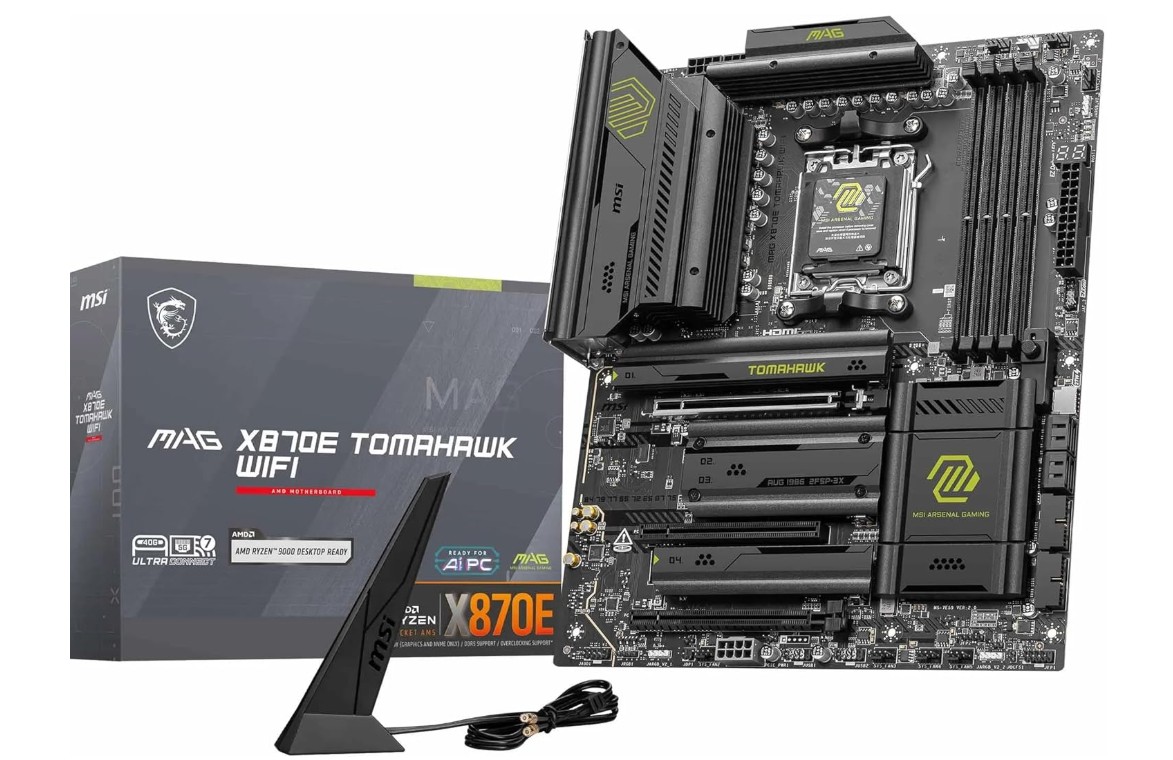
MSI MAG X870E Tomahawk WiFi Motherboard
MSI MAG X870E Tomahawk WiFi Motherboard
The MSI MAG X870E Tomahawk WiFi is a strong and well-balanced motherboard that pairs perfectly with the Ryzen 7 9700X. Built on the AM5 platform, it offers a solid mix of performance, stability, and future-proof features that make it a smart choice for gamers, creators, and power users alike. Its 80A SPS VRM design provides reliable power delivery, which ensures that the Ryzen 7 9700X runs smoothly even under demanding workloads or when using Precision Boost Overdrive. Cooling is handled efficiently with extended heatsinks and quality thermal pads, keeping temperatures under control during long sessions.
Memory support is another highlight, with DDR5 compatibility up to 8400+ MT/s (OC). This allows users to take advantage of next-generation speeds, giving the system a noticeable edge in gaming performance and heavy multitasking. Storage and expansion options are equally impressive, thanks to PCIe 5.0 x16 for the latest GPUs and multiple M.2 slots, including Gen5 support, for ultra-fast NVMe drives. This means you can build a system that is not only powerful today but also ready for future upgrades.
Connectivity is a strong point as well, with Wi-Fi 7 and 5G LAN ensuring lightning-fast networking whether you prefer wireless or wired setups. There’s also a wide array of USB ports, including high-speed Type-C, making it easier to connect modern peripherals and external storage devices. MSI has also added user-friendly touches like tool-free M.2 installation, BIOS Flashback, and an EZ PCIe release button, which make building and maintaining the system less of a hassle.
Verdict
Overall, the MSI MAG X870E Tomahawk WiFi offers excellent value and performance for anyone looking to maximize the Ryzen 7 9700X. It combines strong power delivery, fast memory and storage support, and cutting-edge connectivity into a reliable ATX package that can easily handle both gaming and productivity needs.
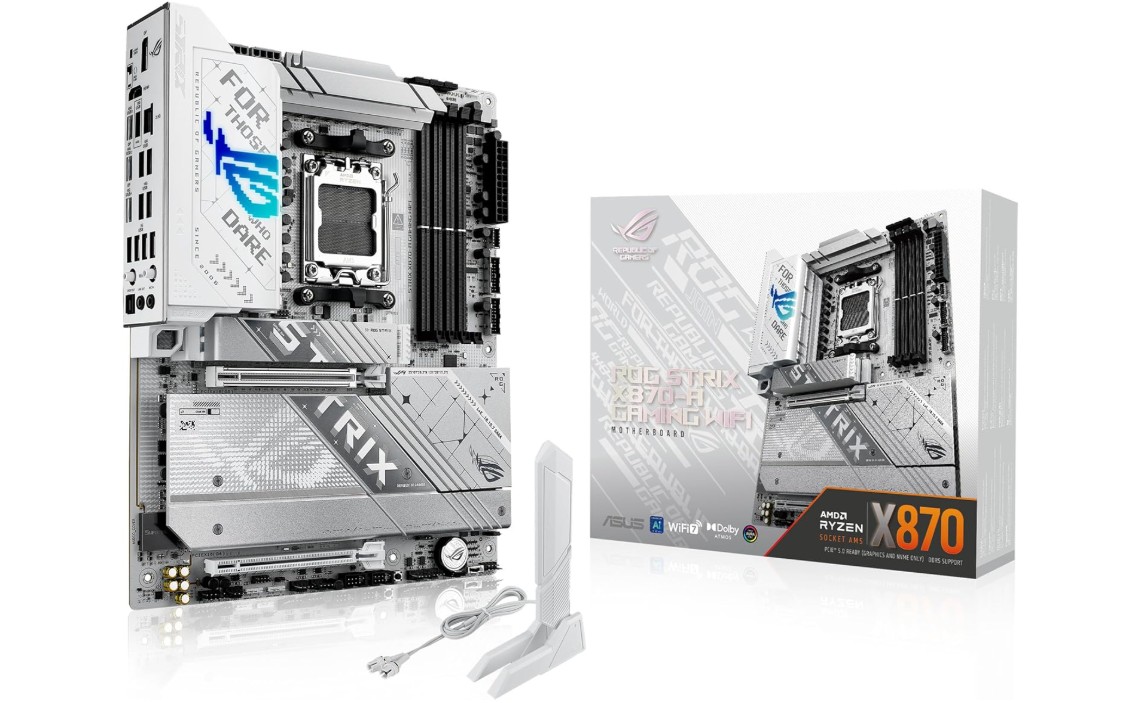
ASUS ROG Strix X870-A Motherboard
ASUS ROG Strix X870-A Motherboard
The ASUS ROG Strix X870-A Gaming WiFi is a powerhouse motherboard that matches perfectly with the Ryzen 7 9700X, bringing together cutting-edge features, strong power delivery, and user-friendly innovations. Designed for enthusiasts and gamers who want both performance and reliability, this board delivers on all fronts while maintaining the signature ROG Strix style.
With its 16+2+2 power stage design, the motherboard ensures stable and efficient power delivery to the Ryzen 7 9700X, even when using features like Precision Boost Overdrive or custom overclocking. ASUS adds unique enhancements like Dynamic OC Switcher and Core Flex, which intelligently balance performance and efficiency depending on workload. For those who enjoy pushing their hardware, the AI Overclocking system simplifies tuning while maintaining stability, making it a great option for both beginners and advanced users.
On the memory side, DDR5 support with ASUS AEMP profiles ensures that you can maximize performance without tedious manual tweaking. Paired with PCIe 5.0 x16 for next-gen GPUs and four M.2 slots including PCIe Gen5 support, this board provides an excellent platform for high-speed storage and graphics, making it ready for future upgrades.
Connectivity is another strong point, with built-in Wi-Fi 7 and 2.5G LAN ensuring top-tier networking whether you prefer wireless or wired setups. The inclusion of USB4, along with multiple high-speed USB ports, makes connecting peripherals, storage devices, or VR headsets seamless. Convenience features like Q-Release Slim for easier GPU removal and BIOS Flashback add to the overall smooth building experience.
Visually, the Strix X870-A carries the modern ROG aesthetic with sleek design elements and Aura Sync RGB support, allowing you to customize the look to match your build.
Verdict
Altogether, this motherboard is an excellent choice for pairing with the Ryzen 7 9700X, delivering a perfect balance of raw performance, advanced connectivity, and user-focused features.
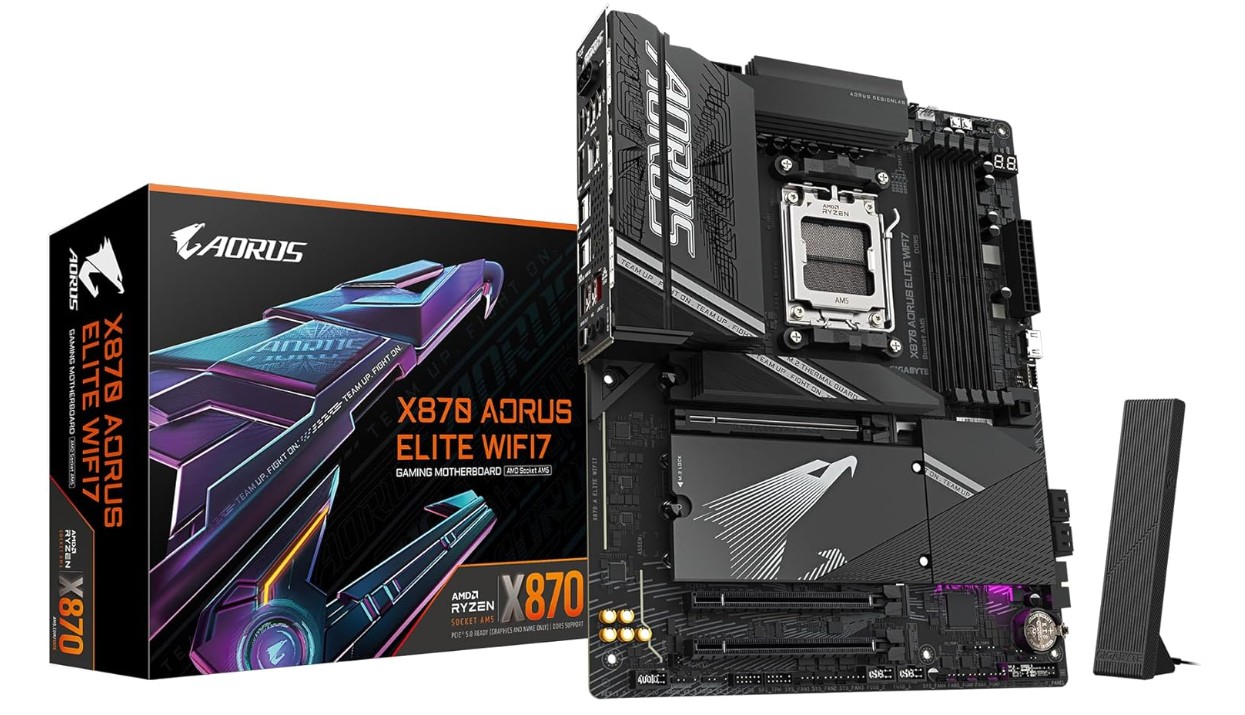
GIGABYTE X870 AORUS Elite Motherboard
GIGABYTE X870 AORUS Elite Motherboard
The GIGABYTE X870 AORUS Elite WIFI7 is a highly capable and well-rounded motherboard that pairs beautifully with the Ryzen 7 9700X, offering a blend of performance, durability, and modern connectivity. As part of the AORUS lineup, it delivers a premium feel without the extreme price tag of flagship boards, making it an attractive choice for gamers and power users who want strong features at a reasonable cost.
One of the standout aspects of this motherboard is its robust support for DDR5 memory, allowing you to push speeds to higher levels for smoother multitasking and gaming performance. Combined with PCIe 5.0 support on the primary x16 slot, the board ensures that your Ryzen 7 9700X and next-gen GPU will have the bandwidth they need for demanding applications and future upgrades. Storage is equally impressive, with four M.2 slots including Gen5 support, giving you the flexibility to build a lightning-fast storage array for games, creative workloads, or large data transfers.
Connectivity is another strong selling point. With Wi-Fi 7 and 2.5GbE LAN, you’re covered whether you prefer wireless or wired networking, both offering reliable, high-speed connections. USB4 support adds even more value, enabling faster external drives and versatile connectivity for modern peripherals. The EZ-Latch system makes GPU and M.2 installation easier and tool-free, a welcome touch for builders who appreciate convenience.
Durability and peace of mind are also part of the package, thanks to reinforced PCIe slots and GIGABYTE’s impressive 5-year warranty, which signals long-term reliability. The motherboard’s thermal design with enlarged heatsinks and M.2 thermal guards ensures stable performance even under heavy workloads.
Verdict
Overall, the GIGABYTE X870 AORUS Elite WIFI7 is an excellent choice for Ryzen 7 9700X users. It strikes a great balance between high-end features, ease of use, and future-proofing, making it a dependable backbone for any modern AMD build.
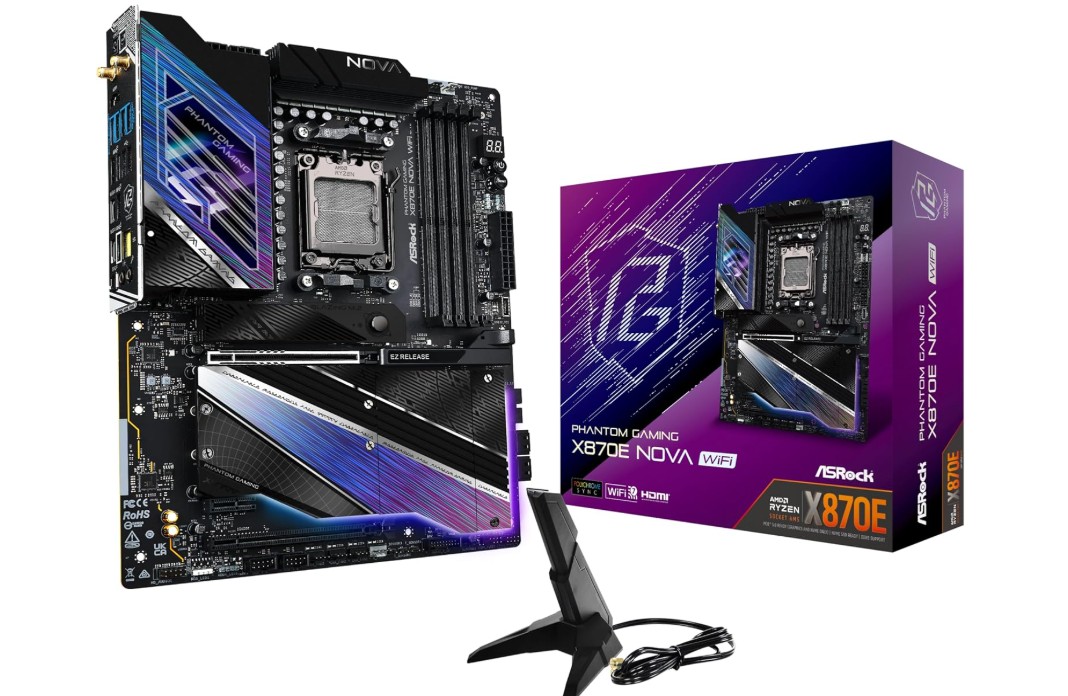
ASRock Phantom Gaming X870E Nova Motherboard
ASRock Phantom Gaming X870E Nova Motherboard
The ASRock Phantom Gaming X870E Nova WiFi is a feature-packed motherboard that pairs seamlessly with the Ryzen 7 9700X, offering the right mix of performance, aesthetics, and future-ready technology. Designed for gamers and creators who want premium features without going all the way to extreme enthusiast pricing, this board delivers stability, speed, and convenience in an elegant ATX package.
One of the standout features is its excellent memory support. With DDR5 compatibility up to 8200 MHz (OC) and a capacity of up to 256GB, the X870E Nova provides incredible flexibility for both gaming and productivity workloads. This makes it an ideal platform for Ryzen 7 9700X users who want to take advantage of faster RAM speeds for smoother gameplay, faster load times, and better multitasking performance. Combined with PCIe 5.0 x16 support, the board is ready to handle the latest GPUs without bandwidth limitations, ensuring long-term viability.
Storage expansion is equally impressive, offering multiple M.2 slots including PCIe Gen5 support for ultra-fast NVMe drives. This allows users to build high-speed storage arrays ideal for modern AAA titles, creative applications, or large data transfers. Networking is another strong suit, with Wi-Fi 7 and high-speed wired LAN ensuring reliable, low-latency connections whether you game online or work with cloud-based workloads.
ASRock has also focused on user convenience and build quality. The board includes a premium VRM design for stable CPU power delivery, reinforced PCIe slots for heavy GPUs, and extensive heatsinks with M.2 cooling solutions to keep temperatures in check. Added features like USB4 support, BIOS Flashback, and Polychrome RGB lighting make the overall package even more appealing.
Verdict
In short, the ASRock Phantom Gaming X870E Nova WiFi is a fantastic choice for pairing with the Ryzen 7 9700X. It combines performance, reliability, and modern connectivity into a sleek and future-proof design, making it a solid option for gamers and power users alike.
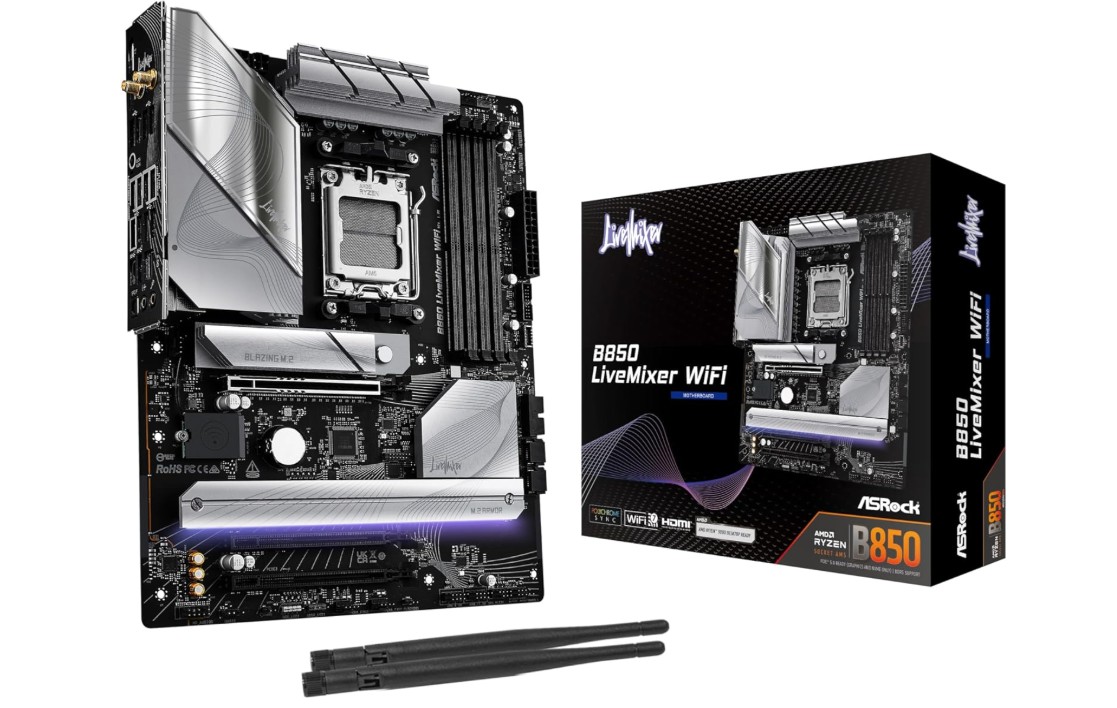
ASRock AMD B850 LiveMixer Motherboard
ASRock AMD B850 LiveMixer Motherboard
The ASRock B850 LiveMixer WiFi 7 is a stylish and capable motherboard that pairs nicely with the Ryzen 7 9700X, offering a balance of performance, features, and unique design flair. Built on the AM5 platform, it provides support for the latest Ryzen 9000, 8000, and 7000 processors, making it a solid choice for gamers, streamers, and creators who want a dependable yet visually distinct system.
One of its key strengths is memory performance. With support for DDR5 speeds up to 8000+ MHz (OC) and a maximum capacity of 256GB, this board gives Ryzen 7 9700X users plenty of headroom for gaming, multitasking, and productivity workloads. Paired with PCIe 5.0 x16, it ensures compatibility with next-gen graphics cards, delivering smooth performance for both high-resolution gaming and demanding creative tasks. Storage expansion is well-covered too, with multiple M.2 slots, including Gen5 support, as well as SATA3 ports for traditional drives.
Connectivity is another highlight of the B850 LiveMixer. It comes with Wi-Fi 7 for ultra-fast wireless networking and high-speed wired LAN for low-latency connections. For display options, it offers both HDMI and DisplayPort outputs, making it convenient for setups that rely on integrated graphics or multi-monitor configurations. Users will also appreciate the inclusion of USB 3.2 Gen2x2 and Type-C ports, which provide fast transfer speeds and compatibility with modern devices.
ASRock adds thoughtful touches like BIOS Flashback for easy updates, reinforced PCIe slots for GPU stability, and solid VRM cooling to maintain consistent performance. The board also stands out visually with its unique LiveMixer design theme, catering to those who want something different from the usual dark or minimalist styles.
Verdict
Overall, the ASRock B850 LiveMixer WiFi 7 is a great companion for the Ryzen 7 9700X. It offers reliable performance, modern connectivity, and a creative aesthetic that makes it an appealing option for builders who want both function and personality in their rigs.
Motherboards for Ryzen 7 9700X: A Complete Buying Guide
Your motherboard is the backbone of a Ryzen 7 9700X build. It routes power to the CPU, connects your GPU, RAM, storage, and peripherals, and determines what “quality-of-life” features you’ll enjoy for years—things like quick BIOS recovery, Wi-Fi 7, USB4, and abundant M.2 storage. Pick well and your 9700X will hit its advertised clocks, stay cool, and remain stable under load. Pick poorly and you’ll fight voltage droop, throttling, boot quirks, and upgrade roadblocks.
The good news: AMD’s AM5 platform is mature, fast, and forward-leaning. With the 9700X (Zen 5, 8C/16T), you’re shopping primarily among the X870E, X870, B850, and B840 chipsets. Each tier balances lanes, I/O, and price differently. This guide breaks it all down and helps you match a board to your budget, performance targets, and build style.
AM5 Chipset Landscape (X870E vs X870 vs B850 vs B840)
- X870E (“Extreme”)
- Target: Enthusiasts who want maximal PCIe Gen5 for both GPU and storage, rich I/O, and the strongest power delivery.
- Typical perks: PCIe 5.0 x16 for GPU, multiple PCIe 5.0 M.2 slots, USB4 on many models, Wi-Fi 7, premium audio, debug tools (POST code/Q-LED), robust VRM heatsinks.
- Who it’s for: High-end builds, heavy creators, long-term upgraders.
- X870
- Target: Performance users who want most of the X870E experience with a bit less lane abundance and slightly leaner VRM/I-O.
- Typical perks: PCIe 5.0 x16 for GPU, at least one Gen5 M.2, strong USB portfolio (often includes USB4), Wi-Fi 7/2.5G LAN.
- Who it’s for: High-refresh gaming and productivity without paying the “everything maxed” premium.
- B850
- Target: Value-focused builders who still want DDR5 tuning, PCIe 5.0 for GPU (often) and at least one fast M.2, plus modern networking.
- Typical perks: 1× PCIe 5.0 x16, Gen4/Gen5 mix on M.2, Wi-Fi 6E/7 or at least 2.5G LAN, good VRM for 8-core CPUs, sensible heatsinks.
- Who it’s for: Smart mid-range systems that balance features and price.
- B840
- Target: Budget and office/light gaming rigs.
- Typical perks: Fewer high-end I/O features, mostly Gen4 M.2, smaller heatsinks.
- Who it’s for: Tight budgets, systems using midrange GPUs, or compact/home office PCs.
Bottom line: For a Ryzen 7 9700X, B850 and X870 are the sweet spots. Choose X870E if you want the richest storage and I/O options and heavier thermals/VRMs for sustained workloads. Pick B840 only if you’re minimizing cost and your needs are modest.
Key Factors to Consider When Choosing a Motherboard for Ryzen 7 9700X
When building a PC around the Ryzen 7 9700X, selecting the right motherboard is just as important as choosing the CPU itself. The motherboard acts as the foundation of your system, affecting stability, performance, upgrade potential, and overall user experience. With AMD’s AM5 platform bringing new technologies like DDR5 memory, PCIe 5.0, Wi-Fi 7, and USB4 support, the decision becomes even more crucial. Below, we’ll explore the key factors in detail to help you make an informed choice.
1. Socket and Chipset Compatibility
The Ryzen 7 9700X is designed for the AM5 socket, which supports AMD’s 9000, 8000, and 7000 series CPUs. Therefore, you must choose a motherboard with an AM5 socket.
The chipset defines the motherboard’s feature set and price point. The most common chipsets for the Ryzen 7 9700X include:
- X870E – Premium enthusiast option with PCIe 5.0 lanes for both GPU and storage, advanced connectivity, strong VRMs, and high overclocking potential. Best for power users.
- X870 – A more balanced high-end option with PCIe 5.0 for storage and GPU, excellent networking, and robust features for gaming and productivity.
- B850 – Mainstream option offering excellent value. Supports PCIe 5.0 for GPU, DDR5 memory, and modern connectivity, but with fewer high-end extras.
Takeaway: Match the chipset to your needs—X870E for maximum future-proofing, X870 for balanced performance, and B850 for budget-conscious builders.
2. Power Delivery (VRM Quality)
Voltage Regulator Modules (VRMs) are essential for delivering stable power to the CPU. The Ryzen 7 9700X isn’t as demanding as a flagship chip like the Ryzen 9 9950X, but it still benefits from strong VRMs, especially if you plan to overclock.
- High-end boards (X870E) usually feature 16+ power phases with high-quality MOSFETs for stability under heavy loads.
- Mid-range boards (X870/B850) typically have 12–14 power phases, which is sufficient for Ryzen 7 9700X even at overclocked settings.
Takeaway: Look for boards with well-cooled VRMs, preferably with heatsinks, to ensure long-term reliability.
3. Memory Support (DDR5 Performance)
The AM5 platform supports DDR5 memory exclusively. For the Ryzen 7 9700X, fast DDR5 helps maximize performance, especially in gaming and memory-intensive workloads.
- Frequency: Look for boards that support DDR5 speeds of 6400 MHz to 8000+ MHz (OC). Higher speeds improve frame rates and reduce latency.
- Capacity: Most AM5 boards support up to 128GB or 256GB of DDR5 RAM, which is more than enough for gaming and professional workloads.
- Tuning: Features like AMD EXPO profiles simplify memory overclocking for stable high-speed performance.
Takeaway: If you’re targeting high FPS gaming, pick a motherboard with strong DDR5 overclocking support and stability features.
4. Expansion Slots and PCIe Support
The Ryzen 7 9700X benefits from PCIe 5.0, which doubles the bandwidth compared to PCIe 4.0. The right expansion slot layout can determine GPU and storage performance.
- PCIe 5.0 x16 slot – Ideal for future-proofing your graphics card upgrade. Most X870/X870E boards support it.
- M.2 slots – At least one should support PCIe 5.0 NVMe SSDs, while others may be PCIe 4.0. Look for 3–4 slots if you need multiple drives.
- Reinforced slots – Heavy GPUs benefit from reinforced PCIe slots to prevent sagging.
Takeaway: Ensure your motherboard offers at least one PCIe 5.0 x16 slot and Gen5 M.2 storage if you plan to maximize next-gen hardware.
5. Networking and Connectivity
Networking plays a huge role in modern systems, whether for gaming, streaming, or professional workloads.
- Wi-Fi 7 – Many newer boards now include Wi-Fi 7, which offers faster wireless speeds, lower latency, and better stability. Perfect for high-performance gaming.
- LAN – High-end boards often include 5G or 10G LAN, while mid-range ones feature 2.5G LAN. Choose based on your internet setup.
- Bluetooth 5.4 or newer – Useful for wireless peripherals like headsets, controllers, and keyboards.
Takeaway: For competitive gaming or content creation, prioritize motherboards with Wi-Fi 7 and at least 2.5G LAN.
6. Storage Options
With games and applications growing in size, storage flexibility is important.
- M.2 Gen5 support – For blazing-fast SSD performance.
- M.2 Gen4 slots – Still very fast and more affordable.
- SATA3 ports – Good for HDDs or older SSDs.
Takeaway: Aim for at least two M.2 slots, one being Gen5, so you can pair a fast boot drive with additional storage drives.
7. USB and I/O Ports
The Ryzen 7 9700X benefits from modern connectivity options for peripherals and external devices.
- USB4 / Thunderbolt – Found on higher-end boards, ideal for ultra-fast external storage and docking setups.
- USB 3.2 Gen2x2 Type-C – Delivers up to 20Gbps transfer speeds, great for high-performance peripherals.
- Front-panel connectivity – Look for front USB-C headers for modern cases.
Takeaway: The more versatile the I/O, the better prepared your system is for modern and future peripherals.
8. BIOS and Overclocking Features
Overclocking the Ryzen 7 9700X can unlock extra performance, and the motherboard’s BIOS plays a major role.
- AI Overclocking – Found in ASUS ROG and some MSI boards, this helps beginners achieve safe overclocks.
- Dynamic OC Switcher & Core Flex – Features that optimize power and performance automatically.
- BIOS Flashback – Allows easy updates without a CPU or GPU installed, ensuring compatibility with future processors.
Takeaway: If you want to push your Ryzen 7 9700X, prioritize boards with advanced tuning options and BIOS features.
9. Cooling and Thermal Design
Keeping your system cool is critical for performance and longevity.
- VRM heatsinks – Ensure the power delivery system remains stable.
- M.2 heatsinks – Prevent thermal throttling of SSDs.
- Fan headers – Look for multiple headers (including pump headers for liquid cooling).
Takeaway: A well-cooled motherboard ensures stable performance under heavy loads.
10. Audio Quality
Good onboard audio can save you from buying a separate sound card.
- High-definition audio codecs (ALC4080/ALC1220) – Deliver clear, immersive sound.
- Premium capacitors and shielding – Reduce noise interference.
Takeaway: If you’re a gamer or content creator, strong onboard audio is a plus.
11. Build Aesthetics and Design
Since many PC cases feature tempered glass, aesthetics are often important.
- RGB lighting – Found in most gaming motherboards, customizable via software.
- Color schemes – Choose a board that complements your build’s look (e.g., ASUS ROG with aggressive styling vs. ASRock LiveMixer with creative designs).
- Reinforced build – Metal shielding and durable PCB layers add to the longevity.
Takeaway: Don’t overlook design—your motherboard will be at the center of your build’s appearance.
12. Brand Reliability and Warranty
Reputation and after-sales service matter when investing in a premium board.
- MSI MAG/MEG – Known for stable BIOS and excellent VRMs.
- ASUS ROG/Strix – Feature-rich with AI overclocking and premium build quality.
- GIGABYTE AORUS – Excellent durability and user-friendly features like EZ-Latch.
- ASRock – Competitive pricing and unique designs like the LiveMixer.
Takeaway: Stick with reputable brands that offer 3–5 years of warranty for peace of mind.
13. Price-to-Performance Ratio
Budget is always a deciding factor.
- Enthusiast Builds (X870E) – $400–$600, packed with future-proof features.
- High-End Gaming (X870) – $300–$400, balanced choice for most users.
- Mainstream Value (B850) – $200–$300, solid performance without overspending.
Takeaway: Spend according to your use case—avoid overspending on features you won’t use.
Final Thoughts
Choosing the right motherboard for the Ryzen 7 9700X requires balancing performance, features, and budget. If you’re an enthusiast aiming for maximum future-proofing, an X870E board is ideal. For most gamers and creators, an X870 board provides the right mix of value and performance. And if you want strong essentials without breaking the bank, a B850 board delivers excellent results at a lower cost.
By considering factors like VRM design, DDR5 support, PCIe 5.0, networking, cooling, and brand reliability, you can ensure your Ryzen 7 9700X runs at its full potential for years to come.
A passionate tech enthusiast with a deep interest in the latest innovations, gadgets, and emerging technologies. Always eager to explore cutting-edge hardware and software, I enjoy sharing insights, reviews, and recommendations to help others make informed decisions in the ever-evolving tech world. With a curious mindset and hands-on approach, I stay up-to-date with industry trends, from PCs and gaming to mobile devices and AI-driven tools.






